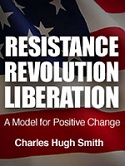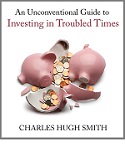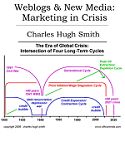

|

|
|||||||||||||
|
Is Democracy Possible in a Corrupt Society? (November 12, 2012) Democracy is for PR purposes only in corrupt neofeudal nations. Correspondent Chris rightly critiqued me for not mentioning democracy (or the lack thereof) in my recent entry on China: Do We Have What It Takes To Get From Here To There? Part 2: China. It is indeed vital to include democracy in any discussion of corruption, for it raises this question: is democracy possible in a corrupt society? We can phrase the question as a corollary: in honor of my new book Why Things Are Falling Apart and What We Can Do About It (print $24) (Kindle $7.95), let's call it WTAFA Corollary #1:
If the citizenry cannot replace a dysfunctional government and/or limit the power of the financial Aristocracy at the ballot box, the nation is a democracy in name only. In other words, if the citizenry cannot dislodge a parasitic, predatory financial Aristocracy via elections, then "democracy" is merely a public-relations facade, a simulacra designed to create the illusion that the citizenry "have a voice" when in fact they are debt-serfs in a neofeudal State. When the Status Quo remains the same no matter who gets elected, democracy is a sham. We might profitably look to Japan as an example of a nation which replaced its dysfunctional dominant party via elections to little effect (Do We Have What It Takes To Get From Here To There? Part 1: Japan). We can ask this question of Greece: in a pervasively corrupt neofeudal society, is democracy even possible? Neofeudalism is characterized by a carefully nurtured facade of social mobility and democracy while the actual machinery of governance is corrupted at every level. This corruption may manifest as first-order daily-life corruption such as buying entry to college, bribing officials for licenses, and so on, but the truly serious corruption is the second-order variety that functions behind the closed doors of central banks and financial/political Elites. Here in the U.S., the people elected Barack Obama in 2008 on the implicit promise that the politically dominant financial sector would be limited in some meaningful fashion. Instead, President Obama immediately nixed any meaningful reform. The progressive case against Obama: The president is complicit in creating an increasingly unequal and unjust society.
Many will claim that Obama was stymied by a Republican Congress. But the primary policy framework Obama put in place -- the bailouts --took place during the transition and the immediate months after the election, when Obama had enormous leverage over the Bush administration and then a dominant Democratic Party in Congress. Here's how a sham democracy works: candidates are duly paraded in front of credulous voters in a "which is better, Bud or Bud Lite?" false-choice marketing blitz, while all the meaningful codifying of Aristocratic rule is directed or purchased by the financial and political Aristocracy (two sides of the same coin). Consider the actions of the Federal Reserve, the dominant financial force in the nation. Though the Fed is nominally under the control of Congress, it is actually like an iceberg: its public pronouncements are the visible 10% above water. The real mass of the Fed’s actions lie beneath the surface, invisible to us mere debt-serf citizens. The Fed’s public mandate, to “promote stable prices, maximum sustainable output and employment,” is solid public relations, of course (we're selflessly focused on the good of the nation, blah blah blah) but it’s also deeply disingenuous, as the Fed’s less PR-pretty agenda is rather transparently to preserve the banking sector’s profits and power at all costs. We can find clues to the Fed’s real goals in its behind-closed-doors actions--the 90% of the iceberg that’s out of public view. On the surface, the Fed increased its balance sheet by about $2 trillion since the 2008 global financial crisis. This electronically created money purchased about $1.1 trillion in mortgage-backed securities (MBS) to support the housing market and $1 trillion in Treasury bonds to keep interest rates low. These two goals--super-low interest rates, a.k.a. zero-interest policy (ZIRP), and supporting assets such as housing and stocks--are the core strategies the Fed is publicly deploying to boost growth and employment. Supporting the banks is not mentioned, for obvious PR reasons. Yet a Government Accountability Office (GAO) audit found the Fed provided $16.1 trillion in “emergency program” loans to global banks from 2007 to 2010, and a Levy Institute study uncovered a total of $29 trillion in Fed support--roughly ten times larger than the Fed’s public programs. (For context, the annual U.S. gross domestic product is about $15 trillion.) This suggests we should take the Fed’s assurances that its policies are all for the public good with a grain of salt roughly the size of the Fed’s headquarters at 20th and Constitution Avenue. Did bailing out the banks truly serve the public good, or did it stymie a much-needed capitalist “creative destruction” of failed financial institutions that have grown so powerful that they are now “too big to fail”? How exactly did enabling the banks to draw upon trillions of dollars of Fed support, safe from public scrutiny, serve the public good? The U.S. Status Quo is also like an iceberg: the visible 10% is what we're reassured "we" control, but the 90% that is completely out of our control is what matters. There is another dynamic in a facsimile democracy: the Tyranny of the Majority. When the Central State issues enough promises to enough people, the majority concludes that supporting the Status Quo, no matter how corrupt, venal, parasitic, unsustainable and dysfunctional it might be, is in their personal interests. Tyranny of the Majority, Corporate Welfare and Complicity (April 9, 2010): Please read this brief excerpt by James Madison to get a flavor for the Tyranny of the Majority:
"A pure democracy can admit no cure for the mischiefs of faction. A common passion or interest will be felt by a majority, and there is nothing to check the inducements to sacrifice the weaker party. Hence it is, that democracies have ever been found incompatible with personal security or the rights of property; and have, in general, been as short in their lives as they have been violent in their deaths." The Tyranny of the Majority is the primary topic of the Federalist Number 10, in which Madison tackles the Achilles Heel of democracy: undesirable passions can very easily spread to a majority of the people, which can then enact its will through the nominally democratic government. Put another way: the Power Elites of a nominal democracy can buy the complicity of the majority by showering them with government benefits and entitlements. This document from the Congressional Budget Office (CBO) displays the Effective Tax Rates (CBO) for American households. After including earned-income tax credits, the bottom 60% of households paid less than 1% of all Federal income taxes, and the households between 60% and 80% paid 13%. The top 20% paid 68.7% of all Federal taxes: Income taxes, Social Security and Medicare, excise and corporate taxes. The top 10% of households paid fully 72.7% of all Federal income tax, the top 5% paid 60.7%, and the top 1% paid 38.8%. In essence, this is a vote-buying scheme by the Status Quo: the top 1% control the policies of the State in alliance with the State's own Elites, and together they buy the complicity of the bottom 60% majority. This is the worst of all possible simulacra of democracy. In the Wikipedia entry linked above, Mancur Olson is cited as arguing in The Logic of Collective Action that narrow, well-organized minorities are more likely to assert their interests over those of the majority. In other words, the Financial Aristocracy asserts its interests over the 99% and then buys the complicity of the bottom 60% with largesse paid for by the top 19% of earners. In Who Rules America?, Sociologist G. William Dumhoff draws an important distinction between the net worth held by households in "marketable assets" such as homes and vehicles and "financial wealth." Homes and other tangible assets are, in Dumhoff's words, "not as readily converted into cash and are more valuable to their owners for use purposes than they are for resale." Financial wealth such as stocks, bonds and other securities are liquid and therefore easily converted to cash; these assets are what Dumhoff describes as "non-home wealth" on his website "Wealth, Income, and Power in America." As of 2007, the bottom 80% of American households held a mere 7% of these financial assets, while the top 1% held 42.7% and the top 20% held fully 93%. In a classic "divide and conquer" tactic, the State's Power Elites have sold a slew of new taxes to fund the guaranteed-to-implode "healthcare reform" (a.k.a. increased funding of sickcare cartels) on those earning $250,000 or more. Everyone earning 25% of that sum loudly applauds "sticking it to the rich" (the Tyranny of the Majority in full flower) while failing to note that the truly wealthy--the ones who don't have any earned income because they don't work in salaried jobs, the ones who own roughly half the nation's productive assets--pay nothing but a slice of their unearned income, much of which is protected by various tax breaks. The State is effectively operated as a fiefdom of the Financial Power Elites--and by that I mean the people earning not $300,000, but those earning $30 million or more annually-- that buys the complicity of the lower 60% with enough largesse to keep them supportive of the Status Quo. In this facsimile democracy, citizenship has devolved to advocacy for a larger share of Federal government swag. The U.S. Status Quo rules via the second-order corruption of financial Aristocracy and Tyranny of the Majority. Is Democracy Possible in a Corrupt Society? No, it is not. Our democracy is a PR sham.
My new book Why Things Are Falling Apart and What We Can Do About It is now available in print and Kindle editions--20% to 30% discounts
this week only.
Things are falling apart—that is obvious. But why are they falling
apart? The reasons are complex and global. Our economy and society have structural
problems that cannot be solved by adding debt to debt. We are becoming poorer, not
just from financial over-reach, but from fundamental forces that are not easy to identify
or understand. We will cover the five core reasons why things are falling apart:
 1. Debt and financialization
1. Debt and financialization
2. Crony capitalism and the elimination of accountability 3. Diminishing returns 4. Centralization 5. Technological, financial and demographic changes in our economy Complex systems weakened by diminishing returns collapse under their own weight and are replaced by systems that are simpler, faster and affordable. If we cling to the old ways, our system will disintegrate. If we want sustainable prosperity rather than collapse, we must embrace a new model that is Decentralized, Adaptive, Transparent and Accountable (DATA).
We are not powerless. Not accepting responsibility and being powerless are two sides of
the same coin: once we accept responsibility, we become powerful.
To receive a 30% discount on the print edition: $16.80 (retail $24), follow the link, open a Createspace account and enter discount code B9G5JDXD. (This is the only way I can offer a discount.) 



Please click on a book cover to read sample chapters
NOTE: gifts/contributions are acknowledged in the order received. Your name and email remain confidential and will not be given to any other individual, company or agency.
"This guy is THE leading visionary on reality.
He routinely discusses things which no one else has talked about, yet,
turn out to be quite relevant months later."
Or send him coins, stamps or quatloos via mail--please request P.O. Box address. Subscribers ($5/mo) and contributors of $50 or more this year will receive a weekly email of exclusive (though not necessarily coherent) musings and amusings. At readers' request, there is also a $10/month option. What subscribers are saying about the Musings (Musings samples here): The "unsubscribe" link is for when you find the usual drivel here insufferable.
All content, HTML coding, format design, design elements and images copyright © 2012 Charles Hugh Smith, All rights reserved in all media, unless otherwise credited or noted. I am honored if you link to this essay, or print a copy for your own use.
Terms of Service:
|
Add oftwominds.com |